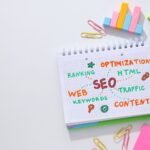What Elements Are Foundational for SEO with AI: Key Strategies
The digital marketing landscape is undergoing a profound transformation, powered by the rapid evolution of Artificial Intelligence in Search Engine Optimization (SEO). What once relied on manual keyword optimization and broad assumptions has now become a data-driven, AI-enhanced practice. Industry leaders are recognizing AI’s potential. By 2026, 80% of companies expect AI in marketing to become a primary growth driver, with widespread adoption across marketing departments. Let’s learn What Elements Are Foundational for SEO with AI.
Modern search engines are no longer simply about matching keywords—they now understand context, user intent, and content relevance through advanced neural networks. With Natural Language Processing (NLP) and machine learning, the way search engines interpret and rank content has evolved, making SEO an intelligent, nuanced process.
AI-Optimized Keyword Research: The Foundation of SEO
Keyword research has always been the backbone of SEO, but AI is revolutionizing how we discover, analyze, and optimize keywords. Traditional keyword research involved manually searching for relevant terms, analyzing competition, and guessing which phrases would rank well. Today, AI-driven keyword research takes a data-backed approach, automating and enhancing the process to provide faster, more accurate insights.
How AI is Changing Keyword Research
AI-powered SEO tools analyze massive datasets to uncover patterns, trends, and user intent, making keyword research more precise and effective. Here’s how AI improves keyword research:
- Semantic Search Optimization – AI understands context, synonyms, and related terms, not just exact-match keywords.
- Search Intent Analysis – AI determines why users search for a term (informational, transactional, navigational).
- Long-Tail Keyword Discovery – AI finds low-competition, high-converting keywords that humans often overlook.
- Predictive Keyword Trends – AI predicts future search trends based on historical data.
- Competitor Keyword Analysis – AI reveals what keywords your competitors rank for and identifies gaps in your strategy.
AI-optimized Keyword Research Tools & Their Functions
| AI SEO Tool | Primary Function |
|---|---|
| SEMrush | AI-driven keyword research, competition analysis, and trend forecasting |
| Ahrefs | Keyword difficulty analysis and backlink insights |
| Google Keyword Planner | AI-enhanced search volume forecasting |
| Frase.io | AI-optimized search intent analysis and content gap research |
| Surfer SEO | AI-driven on-page keyword optimization |
These tools allow SEO professionals to go beyond basic keyword research and uncover more valuable search opportunities.
Understanding Semantic Search & AI-Driven Intent Matching
Modern SEO is no longer about stuffing keywords into content. Google’s AI understands the meaning behind searches which is called semantic search.
Semantic search is how AI interprets search queries in a human-like way by understanding:
- Synonyms & Related Terms: AI recognizes that “best-running shoes” and “top sneakers for running” are the same thing.
- Search Context – AI analyzes previous searches, location, and device type to refine results.
- User Intent – AI categorizes search queries into four main types:
| Search Intent | Example Query | AI’s Role |
|---|---|---|
| Informational | “How does AI affect SEO?” | AI prioritizes in-depth blog posts, research papers, and guides. |
| Navigational | “SEMrush homepage” | AI ranks official websites first. |
| Transactional | “Buy SEO software” | AI promotes product pages and eCommerce listings. |
| Commercial | “Best AI SEO tools in 2024” | AI ranks comparison articles, reviews, and lists. |
AI-Driven Keyword Clustering: The New Approach to SEO
Instead of targeting one keyword per page, AI groups related keywords into clusters, helping websites rank for multiple search terms at once.
AI for Long-Tail Keyword Discovery & Low-Competition Opportunities
AI specializes in uncovering long-tail keywords, which are longer, more specific search phrases that tend to:
- Have lower competition
- Attract higher-intent users
- Convert better than broad keywords
Predictive AI for SEO: Forecasting Keyword Trends Before They Happen
One of the most powerful aspects of AI is predicting future search trends. AI tools analyze:
- Search volume trends (Are searches increasing or decreasing?)
- Seasonal keyword fluctuations (Which keywords peak at different times of the year?)
- Emerging topics (What new trends are gaining traction?)
By leveraging predictive AI, SEO professionals can optimize for rising keywords before competitors catch on.
AI & Content Optimization: High-Ranking Content Creation
Content remains king in SEO, but AI has completely transformed how we create, optimize, and rank content. Search engines like Google are no longer just looking for keyword-stuffed pages—they want content that is highly relevant, user-friendly, and aligned with search intent.
With AI-powered SEO tools, businesses can now:
- Generate high-quality, optimized content faster.
- Ensure content matches search intent more effectively.
- Analyze competitors and fill content gaps.
- Improve readability, structure, and engagement.
- Optimize for Google’s AI-driven ranking factors.
How AI is Enhancing Content Creation
AI-optimized content tools like Jasper, Copy.ai, and Frase.io allow businesses to automate parts of the content creation process while still maintaining quality. Here’s how AI improves content production:
- AI Generates Blog Post Ideas – AI analyzes trending topics, search queries, and competitor content to suggest high-performing content ideas.
- AI Writes Content Drafts – AI can generate first drafts, introductions, outlines, and summaries in seconds.
- AI Enhances Readability – AI tools like Grammarly improve grammar, tone, and readability.
- AI Personalizes Content – AI tailors blog posts, emails, and landing pages to specific audiences.
Natural Language Processing (NLP) & AI for Content SEO
Google’s AI-driven updates like BERT and MUM rely on Natural Language Processing (NLP) to better understand and rank content.
| NLP Feature | Impact on SEO |
|---|---|
| Semantic Understanding | Google ranks content based on meaning, not just keywords. |
| Context Awareness | AI knows if a phrase has multiple meanings and ranks accordingly. |
| Better Answer Matching | AI ranks content that provides direct, clear answers to user queries. |
AI-Driven Content Optimization Tools & Techniques
AI doesn’t just help write content—it analyzes and improves it as well. Here’s how AI-powered tools enhance content optimization:
| AI Tool | Optimization Feature |
|---|---|
| Surfer SEO | Analyzes top-ranking pages and suggests content length, keyword density, and headings. |
| Frase.io | Helps match content with search intent and suggests missing topics. |
| Grammarly & Hemingway | Improves grammar, readability, and engagement. |
| MarketMuse | AI-optimized topic modeling to help cover more relevant subtopics. |
How AI Improves Content Structure & Readability
Google favors well-structured, easy-to-read content. AI tools analyze user behavior and suggest ways to improve:
- Headings & Subheadings (H1, H2, H3, etc.) – AI helps structure content logically to improve scannability.
- Paragraph Length – AI suggests breaking long paragraphs into smaller, digestible sections.
- Bullet Points & Numbered Lists – AI recommends adding lists to improve readability and rankings.
- Sentence Clarity – AI-optimized writing assistants suggest simpler sentence structures for better engagement.
AI for Featured Snippets & People Also Ask (PAA) Optimization
Featured Snippets (Position #0) and People Also Ask (PAA) boxes dominate Google’s search results. AI can help optimize content for these highly visible areas.
How AI Aligns Content with Google’s AI-Driven Ranking Factors
To rank high, content must align with Google’s AI-optimized ranking signals. Here’s a quick guide to what matters most:
| Google AI Update | Content Optimization Tip |
|---|---|
| RankBrain | Focus on search intent, engagement metrics, and readability. |
| BERT | Write content in natural, conversational language. |
| MUM | Optimize for multimodal search (text, images, video). |
| Helpful Content Update | Ensure content is useful, authoritative, and engaging. |
Technical SEO Enhancements with AI
Technical SEO serves as the backbone of any successful search engine optimization strategy. Without a strong technical foundation, even the best content can struggle to rank. Search engines need to efficiently crawl, index, and understand your website before they can serve it to users.
Artificial Intelligence (AI) has completely transformed technical SEO, making it easier to identify and fix website issues. In the past, SEO professionals had to manually check for broken links, duplicate content, and site speed issues, but AI can now automate the entire process, saving time and improving accuracy.
AI-powered tools crawl websites faster than traditional methods, pinpoint technical errors, and even provide actionable recommendations for improvement. Whether it’s optimizing Core Web Vitals, improving mobile usability, or implementing structured data, AI ensures that your website is fully optimized for search engine visibility.
AI-Optimized Website Audits & Crawling Efficiency
One of the most time-consuming tasks in SEO is performing a comprehensive website audit. AI tools like Screaming Frog, Sitebulb, and Google Search Console have revolutionized how audits are conducted. Instead of manually sifting through thousands of pages, AI-powered site crawlers can scan an entire website within minutes, identifying errors and areas for improvement.
Common technical SEO issues that AI helps detect include:
- Broken Links & Redirect Chains – AI crawlers scan every link on your site, identifying 404 errors and unnecessary redirects.
- Duplicate Content Detection – AI flags duplicate or thin content issues, ensuring your site doesn’t get penalized for content cannibalization.
- Crawl Budget Optimization – AI determines which pages should be prioritized for indexing, ensuring that Googlebot spends more time on valuable content rather than wasteful pages.
- Internal Linking Improvements – AI helps optimize internal link structures, ensuring that pages with high authority distribute their ranking power efficiently.
With AI-driven audit tools, businesses can ensure that their websites remain search engine-friendly, technically sound, and ready for Google’s evolving algorithms.
AI for Core Web Vitals & Page Speed Optimization
Google’s Core Web Vitals update emphasizes the importance of fast, responsive, and visually stable websites. Slow-loading pages result in higher bounce rates, lower rankings, and a poor user experience.
AI enhances page speed optimization by:
- Identifying resource-heavy elements like large images, unused JavaScript, and uncompressed CSS files that slow down load times.
- Automating lazy loading for images and videos, ensuring they load only when needed, improving perceived page speed.
- Implementing smart caching strategies, storing frequently used assets for faster retrieval.
- Analyzing browser and device performance, ensuring that pages load quickly on mobile and desktop.
AI & Mobile SEO: Ensuring Mobile-First Optimization
Since Google’s mobile-first indexing update, search engines now evaluate websites based on their mobile versions first. This means that if your mobile site isn’t optimized, your rankings may suffer—regardless of how well your desktop site performs.
AI improves mobile SEO by:
- Detecting mobile usability issues, such as touch elements too close together or text that is too small to read.
- Optimizing mobile page speed, ensuring fast-loading experiences on 3G, 4G, and 5G connections.
- Enhancing mobile user behavior tracking, analyzing how users scroll, click, and interact with content on smartphones.
Technical SEO Enhancements with AI
Technical SEO serves as the backbone of any successful search engine optimization strategy. Without a strong technical foundation, even the best content can struggle to rank. Search engines need to efficiently crawl, index, and understand your website before they can serve it to users.
Artificial Intelligence (AI) has completely transformed technical SEO, making it easier to identify and fix website issues. In the past, SEO professionals had to manually check for broken links, duplicate content, and site speed issues, but AI can now automate the entire process, saving time and improving accuracy.
AI-powered tools crawl websites faster than traditional methods, pinpoint technical errors, and even provide actionable recommendations for improvement. Whether it’s optimizing Core Web Vitals, improving mobile usability, or implementing structured data, AI ensures that your website is fully optimized for search engine visibility.
AI-Powered Website Audits & Crawling Efficiency
One of the most time-consuming tasks in SEO is performing a comprehensive website audit. AI tools like Screaming Frog, Sitebulb, and Google Search Console have revolutionized how audits are conducted. Instead of manually sifting through thousands of pages, AI-powered site crawlers can scan an entire website within minutes, identifying errors and areas for improvement.
Common technical SEO issues that AI helps detect include:
- Broken Links & Redirect Chains – AI crawlers scan every link on your site, identifying 404 errors and unnecessary redirects
- Duplicate Content Detection – AI flags duplicate or thin content issues, ensuring your site doesn’t get penalized for content cannibalization.
- Crawl Budget Optimization – AI determines which pages should be prioritized for indexing, ensuring that Googlebot spends more time on valuable content rather than wasteful pages.
- Internal Linking Improvements – AI helps optimize internal link structures, ensuring that pages with high authority distribute their ranking power efficiently.
With AI-driven audit tools, businesses can ensure that their websites remain search engine-friendly, technically sound, and ready for Google’s evolving algorithms.
AI for Core Web Vitals & Page Speed Optimization
Google’s Core Web Vitals update emphasizes the importance of fast, responsive, and visually stable websites. Slow-loading pages result in higher bounce rates, lower rankings, and a poor user experience.
AI enhances page speed optimization by:
- Identifying resource-heavy elements like large images, unused JavaScript, and uncompressed CSS files that slow down load times.
- Automating lazy loading for images and videos, ensuring they load only when needed, improving perceived page speed.
- Implementing smart caching strategies, storing frequently used assets for faster retrieval.
- Analyzing browser and device performance, ensuring that pages load quickly on mobile and desktop.
AI & Mobile SEO: Ensuring Mobile-First Optimization
Since Google’s mobile-first indexing update, search engines now evaluate websites based on their mobile versions first. This means that if your mobile site isn’t optimized, your rankings may suffer—regardless of how well your desktop site performs.
AI improves mobile SEO by:
- Detecting mobile usability issues, such as touch elements too close together or text that is too small to read.
- Optimizing mobile page speed, ensuring fast-loading experiences on 3G, 4G, and 5G connections.
- Enhancing mobile user behavior tracking, analyzing how users scroll, click, and interact with content on smartphones.
AI & Structured Data: Boosting Rich Snippets & Schema Markup
Structured data, also known as schema markup, helps search engines better understand the content on your website. This leads to enhanced search results, including rich snippets, FAQs, and knowledge panels, which improve click-through rates (CTR).
AI simplifies structured data implementation by:
- Automatically generating schema markup for products, reviews, FAQs, and more.
- Detecting missing or incorrect schema markup and offering suggestions for improvement.
- Improving visibility in Google’s Featured Snippets and People Also Ask (PAA) sections.
AI for User Experience (UX) Optimization
User experience (UX) is a critical ranking factor that impacts search engine rankings and user engagement. Google’s search engine algorithms prioritize websites that provide a seamless experience, leading to better search engine rankings and increased web visibility.
The Role of AI in UX Optimization
AI-powered tools now play a crucial role in analyzing user behavior and improving user engagement by optimizing website performance, navigation, and content delivery. AI tools analyze patterns in search behavior, bounce rates, and user intent to make websites more user-friendly.
AI-driven UX enhancements include:
- Personalization – AI customizes content and recommendations based on user behavior, past interactions, and search queries.
- Website Navigation & Layout Optimization – AI identifies friction points in website navigation and suggests improvements.
- Reducing Bounce Rates – AI helps optimize content structure and interlinking to keep users engaged.
- Improving Mobile Experience – AI ensures mobile SEO optimization by identifying and fixing issues that slow loading pages.
AI-Powered Link Building Strategies
Link-building remains a fundamental element of search engine optimization, but traditional link-building methods can be time-consuming. AI-driven SEO strategies automate outreach, analyze competitor backlinks, and identify high-quality linking opportunities, ensuring better search engine rankings.
How AI Enhances Link Building
AI-optimized SEO tools help in:
- Identifying high-authority domains – AI tools analyze search engine results pages to find the most influential websites for backlinks.
- Automated outreach – AI can personalize outreach emails, improving response rates.
- Analyzing competitor backlinks – AI-powered tools like Ahrefs and SEMrush analyze search trends to find potential link-building opportunities.
AI & Local SEO: Optimizing for Geographic Searches
Local SEO is essential for businesses looking to improve online visibility within specific geographic locations. AI helps businesses analyze search trends, optimize local search queries, and ensure better local search results.
AI’s Role in Local SEO Optimization
AI-optimized SEO tools enhance local SEO by:
- Optimizing Google My Business (GMB) listings – AI ensures accurate business information for better local rankings.
- Tracking local search trends – AI tools analyze search behavior and user queries to identify relevant local keywords.
- Managing customer reviews and reputation – AI automates responses to user queries, improving brand trust.
AI & SEO Data Analysis: Measuring Performance & Trends
Data analysis is at the heart of AI-driven SEO strategies. AI analyzes search queries, search volume, and user behavior to refine SEO efforts.
AI-Powered SEO Performance Tracking
AI helps businesses:
- Monitor SEO efficiency– AI tools provide real-time data analysis for better decision-making.
- Track keyword rankings – AI identifies high-performing keywords and suggests improvements.
- Predict search trends – AI-powered predictive analytics help businesses adapt their SEO strategy based on future trends.
With AI-powered SEO data analysis, businesses can optimize technical SEO, content creation, and search rankings based on real-time insights.
SEO professionals must balance AI-optimized SEO with human expertise to ensure relevant content, user-friendly experiences, and ethical search strategies.
The future of SEO with AI
AI-Driven SEO Trends for the Future
- AI-powered keyword research will become more advanced, allowing for better search engine results page ranking.
- Voice search optimization will gain importance, as AI tools analyze voice search queries for better accuracy.
- AI-powered predictive analytics will refine SEO strategies, enabling businesses to adapt to search algorithm updates before they happen.
Preparing for the AI-Driven SEO Future
Businesses should focus on:
- Leveraging AI-powered SEO tools for data-driven content optimization.
- Optimizing for AI-driven search engine algorithms, ensuring better search engine rankings.
- Enhancing website performance and user engagement using AI-based insights.
By adopting AI-powered tools and strategies, businesses can maintain better search engine rankings and secure their place in the future of digital marketing.
Conclusion: What Elements Are Foundational for SEO with AI
Artificial intelligence is no longer optional in SEO—it’s essential for achieving higher search engine rankings and better visibility. As search engines interpret queries with greater sophistication, businesses must adopt AI-driven SEO strategies to stay ahead. Key foundational elements like AI-driven keyword research, content optimization, technical SEO, link building, and user experience are now more efficient and scalable with AI tools. Predictive analytics enable businesses to analyze search trends, optimize performance, and adapt to behavior changes before competitors. While AI automates many SEO tasks, human creativity remains critical for crafting relevant content. So, what elements are foundational for SEO with AI? The answer is leveraging AI-driven keyword research, optimizing content, enhancing technical SEO, improving user engagement, and utilizing AI-driven link-building strategies to ensure long-term success in rankings.
At ChitChat Marketing, we specialize in AI-powered SEO, Google Ads management, and professional web design to help businesses achieve stronger online visibility and higher search rankings. Whether you need AI-driven keyword research, content optimization, or technical SEO improvements, our expert team leverages advanced AI tools to drive measurable growth. Our SEO services boost search rankings, Google Ads management ensures targeted ad campaigns and web design solutions create responsive, high-converting websites. Don’t let outdated marketing strategies hold your business back—contact us today at (203) 947-1463 or info@chitchatmarketingllc.com to schedule a free consultation and discover how AI-driven SEO can elevate your brand’s digital success.
FAQs: What Elements Are Foundational for SEO with AI
How is AI being used in SEO?
AI tools can help detect issues like thin content, poor readability, or lack of keyword relevance, enabling businesses to refine their strategies in real-time. This proactive approach is essential as search engines evolve to favor content that is not only informative but also deeply engaging and authoritative.
How do AI-powered tools analyze search requests?
AI tools analyze search behavior, volume, and user queries to uncover relevant keywords and optimize search results.
How does AI improve search engine rankings?
AI enhances search result rankings by analyzing user behavior, optimizing content, and predicting future trends in search engine algorithms.




